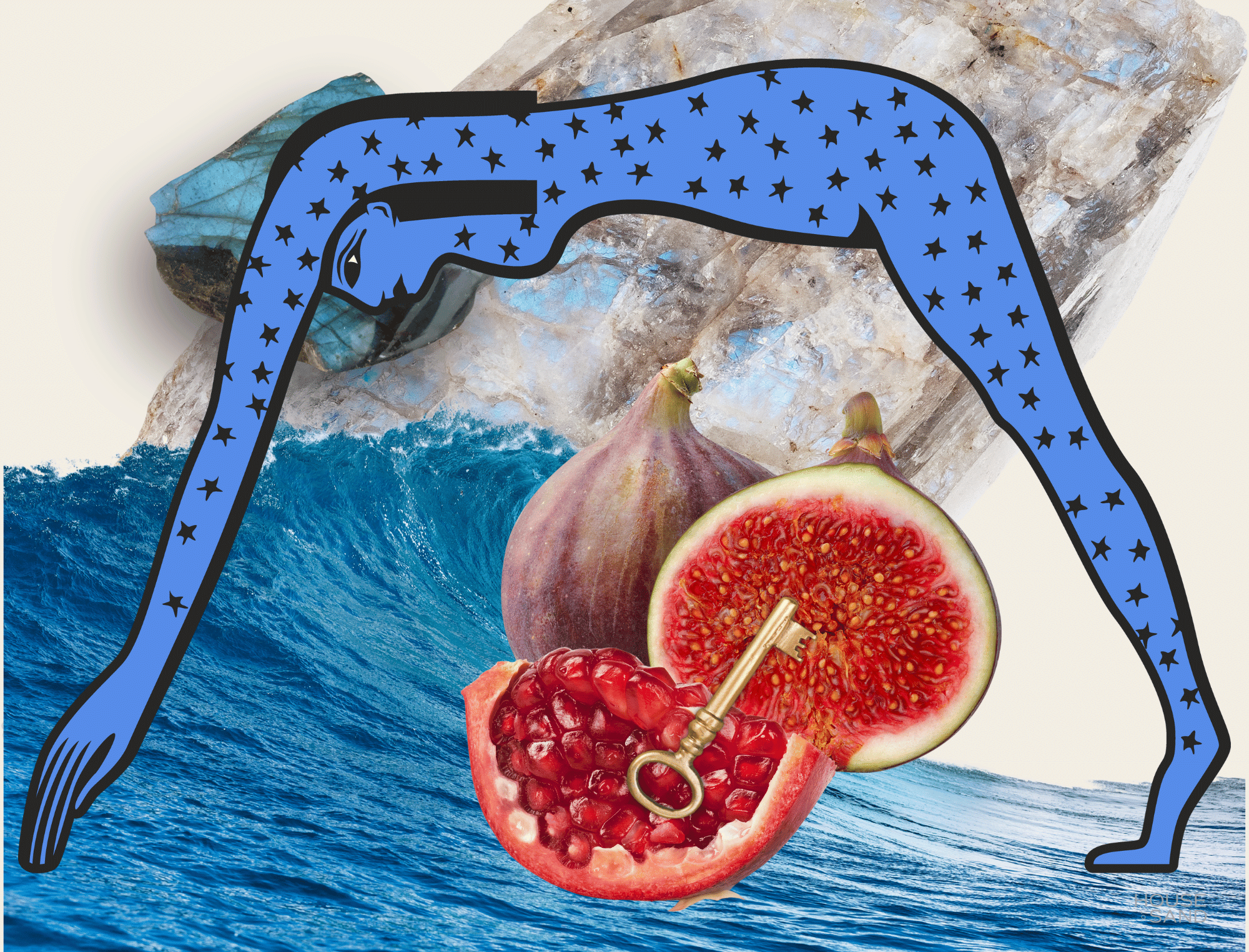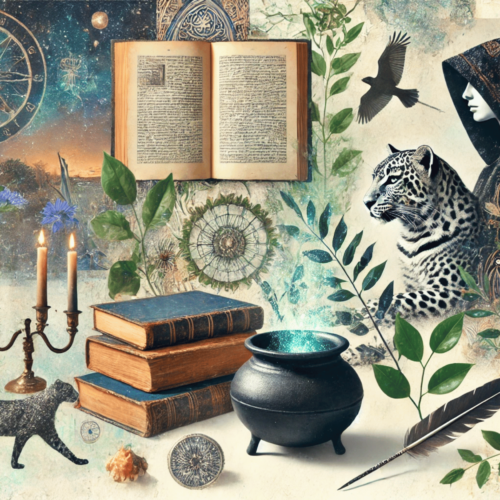The phrase “know thyself” is often attributed to the Oracle at Delphi but this maxim may be even older. In ancient Egyptian temple traditions, initiates were taught that to know oneself was to know the divine. This wasn’t a narcissistic endeavor: it was a mystical one. To look within was to find the divine.
Nuit, the celestial mother, held this knowing. She stretches across the sky in sacred containment, not to enclose but to remind us: you are already held. The journey of self-worth is not one of earning. It is one of remembering. To know yourself, in your shadows and your softness, your ache and your brilliance, is to begin walking the path of real, embodied worth.
Know thyself: the sacred origin of self-worth
Self-worth, then, isn’t about esteem or productivity. It’s about reclaiming your place in the cosmos. You are not something to fix. You are something to remember.
While the phrase “know thyself” is most famously associated with the Temple of Apollo at Delphi, where it was considered a sacred directive from the Oracle and inscribed on the temple’s forecourt, many scholars and mystics believe the concept is even older, with roots in ancient Egypt.
In the Egyptian mystery traditions, similar teachings were inscribed on temple walls and embedded in priestess initiations, especially in sacred schools devoted to Isis, Thoth, and Ma’at. The Temple of Luxor is often cited as an origin point for this wisdom—where initiates were believed to pass through chambers of inner knowledge, shadow integration, and spiritual unveiling.
The Egyptian version of this teaching carried a deeper metaphysical nuance: “Man, know thyself, and thou shalt know the gods.” Or sometimes rendered: “know thyself, and you will know the universe and the gods.”
This wasn’t just a psychological inquiry: it was a mystical imperative. To know oneself was to uncover the divine blueprint within. The ba (soul), ka (life force), and ib (heart) all needed to be in harmony. You weren’t just discovering your personality but remembering your divine origin.
So, when we speak of self-worth in this context, it becomes not just about self-esteem but about reclaiming the sacredness of your being. A kind of cosmic belonging.
Enter Nuit: the sacred dark that holds all
Nuit is the ancient Egyptian goddess of the night sky, the stars, and the cosmic womb. Her body arches over the earth, adorned with constellations.
She is often depicted arched over the earth, her body adorned with stars. She is both celestial mother and infinite expanse. Nuit swallows the sun each night and births it again each morning. She contains the mysteries of life, death, and rebirth within her own body.
Her name means “The Night.” She is not afraid of darkness—she is made of it.
Nuit and the feminine architecture of belonging
1. She is the container of all things
Nuit’s image—stretched protectively over the world, stars scattered across her skin—suggests that everything has a place inside her. Even your doubts, wounds, shadows, and mistakes are held in her embrace. She reminds us that nothing within us is too much. We belong to the cosmos because we are the cosmos.
2. She reframes darkness as sacred
In the overculture, darkness often means ignorance, danger, or nothingness. Nuit reminds us: the dark is where stars live. It is not absence but mystery, potential, and rest. Her myth reminds us that not everything needs to be illuminated to be worthy. Some of your self-worth lives in the unseen. In dreams, silence, and mystery.
Consider what Tyson Yunkaporta says about dark matter in lessons from stone – Indigenous thinking and the Law:
“We yarn about the sentience of stones and the ancient Greek mistake of identifying ‘dead matter’ as opposed to living matter, limiting for centuries to come the potential of western thought when attempting to define things like consciousness and self-organising systems such as galaxies. They viewed space as lifeless and empty between stars; our own stories represented those dark areas as living country, based on observed effects of attraction from those places on celestial bodies.
Theories of dead matter and empty space meant that western science came late to discoveries of what they now call “dark matter”, finding that those areas of “dead and empty” space actually contain most of the matter in the universe.”
3. She is archetypal spaciousness
Nuit expands the conversation beyond the personal into the cosmic. She is the “great yes” — the permission slip to be infinite, undefinable, and whole. Self-worth under Nuit isn’t based on output, productivity, or approval. It’s about remembering: you are made of stars.
4. She is a counter to patriarchal spiritual narratives
In many traditions, divinity is external, masculine, distant. Nuit is immanent. Her body is the cosmos. She reminds us: the sacred is here, in you, in this moment.
Self-worth and “know thyself”: a sacred connection
Know thyself is an edict not of ego, but of devotion. It’s an invitation inward, toward what is most essential and unshakeable in you.
To know yourself is to remember that your worth is not conditional.
You are not worthy because of what you do, produce, fix, or earn. You are worthy because you exist — with your longings, your contradictions, your ancient wisdom, and your still-wounded parts. When you truly know yourself, you no longer outsource your value to the perceptions of others. You become your source.
Self-worth is the natural result of true self-knowing.
When you meet the hidden and forgotten parts of yourself — the child who learned to fawn, the voice that says “don’t share that, they’ll laugh,” the protector who lashes out — and greet them with compassion rather than shame, you become whole. Wholeness births self-worth.
“Know thyself” is a practice.
It unfolds over time, like a ritual or tide. You learn the tone of your inner voice. You learn when you’re performing, when you’re abandoning yourself, and when you’re being yourself. That discernment builds trust. Trust in the self is the foundation of self-worth.
Nuit’s embrace: self-worth as cosmic belonging
Where Venus teaches us to feel our worth through the senses, Nuit teaches us to know our worth through the stars. Her body is the container for all — every emotion, every shadow, every burst of light. You do not need to earn her love. You are inside it already.
To work with Nuit is to ask: Can I accept even this part of myself? Can I stay present, even here?
She invites us to stop fleeing from the parts of ourselves we deem unworthy and to lay down in the sky of our becoming. To rest in our mystery. To trust that we are whole, even when unseen.
Your worth is not a performance. It is not a reward or temporary state. It is the knowing that you are sacred, even now. Even here.
Spellcast: ritual ideas in honor of Nuit
- Create a mirror altar under the stars with dark cloth, crystals, and offerings chosen from below, and a small bowl of water. Gaze into it and whisper: I am held.
- Trace your body with oil or lotion and affirm: This skin is sky. This body is sacred.
- Lie under the stars or visualize them above you. Speak: I am made of stars. I am held by the night. I am part of the infinite. I do not need to be small to be safe.
- Cast a reflection spell. Look into a mirror and ask, What part of me have I been treating as unworthy and is ready to be remembered as divine? Then, say aloud, I do not need to become the light to be worthy of love. I am sacred in the dark.
Crystals that align with Nuit
- Black Moonstone: lunar wisdom, emotional depth, feminine protection
- Labradorite: mystical vision, veiled truth, cosmic navigation
- Lapis Lazuli: ancient knowing, self-awareness, Egyptian priestess lineage
- Obsidian: grounding, shadow work, fierce clarity
- Nuummite: deep time, ancestral healing, oldest stone magic
- Blue Kyanite: energetic flow, dream recall, third eye attunement
- Jet: mourning, grief, spiritual boundaries
Fruits for ritual offerings
Nuit is not traditionally associated with fruits, but I gathered this list in her honor:
- Figs: feminine abundance, hidden wisdom, womb magic
- Blackberries and dark grapes: transformation, depth, sweetness after bitterness
- Pomegranate: death/rebirth, initiation, mystery
- Blueberries and plums: intuition, softness, sacred sweetness
- Mulberries and elderberries: ancestor work, protection, ritual elixirs
- Fermented fruits and wine: alchemy, surrender, ancient memory
When Nuit and Venus dance together
Nuit is a mythic counterbalance to Venus that deepens the invitation into self-acceptance. Where Venus teaches you to feel your worth through the senses, Nuit teaches you to know it through the stars.
Venus gives you radiant magnetism. Nuit gives you cosmic containment.
Together, they say:“You are beautiful, you are vast, and you are sacred in your softness and in your unknowability.“





